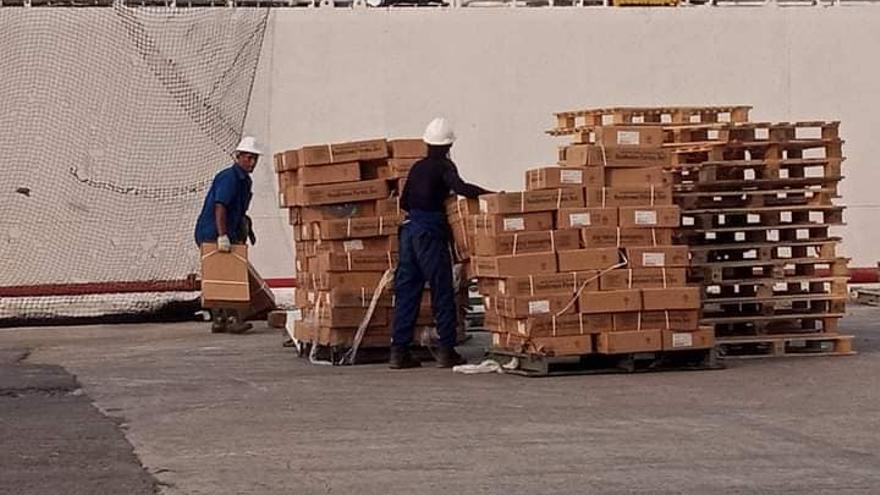
![]() 14ymedio, Madrid, 16 January 2024 — Just as the government was triumphantly boasting of the arrival of a ship laden with chicken destined for distribution to consumers through Cuba’s ration system, figures on poultry imports from the United States in November were being released. After two months of steep declines, sales in this sector doubled, from 8,126 tons in October to 16,648 the following month.
14ymedio, Madrid, 16 January 2024 — Just as the government was triumphantly boasting of the arrival of a ship laden with chicken destined for distribution to consumers through Cuba’s ration system, figures on poultry imports from the United States in November were being released. After two months of steep declines, sales in this sector doubled, from 8,126 tons in October to 16,648 the following month.
Though the wholesale price decreased slightly in November to $1.26 per kilogram, it remains high as economist Pedro Monreal pointed out on his X account, where he posts monthly import figures.
The previous month’s price of $1.30 per kilogram was higher but, since the volume purchased increased considerably, the overall expenditure in November was much greater. While it cost $10.63 million to import chicken from the United States in October, the November figure was more than $21.33 million, more than double. The amount purchased was also very large compared to September’s $14.4 million.
While it cost $10.63 million to import the product from the United States in October, the November figure was more $21.33 million, more than double
“Despite the monthly rebound, chicken imports from the United States, when measured by weight (16,648 tons), were lower in November than the 21,878 ton-average reported for the first ten months of 2023,” writes Monreal. He notes that this is the total figure, not a sales figure, and does not indicate how much of it was sold by the government or private entities.
Complaints about shortages at state-owned stores in December proliferated on social media after the Ministry of Commerce announced the arrival of the cargo ship. “It must be for all of last year because, in Villa Clara at least, there was no rationed chicken to be had. They were only selling it in hard currency stores. It’s been a long time since we’ve gotten any,” read one post.
There were similar complaints across the island, with people reporting they had not seen chicken being sold for Cuban pesos in three months. “The MSMEs* have already gotten hold of it. We’re screwed. Anyone who wants to eat chicken will need to come up with at least 3,000 pesos,” decries another.
Nevertheless, chicken still accounts for the bulk of import spending. Of the total value of food and agricultural imports, which amounted to $28.64 million, only $7.31 million were for other products according to data from the US-Cuba Trade and Economic Council (CubaTrade).
The monthly report indicates that November exports from the United States to Cuba fell 13.4% compared to the same month in the previous year. The total in 2022 was $33 million while a year earlier it was $27.70 million.
Besides chicken parts and a significant amount of eggs (more than one-million dollars’ worth), other import purchases included fresh and processed pork, pork fat, shellfish, black beans, cocoa, coffee, cheese, rice, juices, infant formulas, soy, gelatin, water and popcorn.
At a total of almost two-million dollars, the export of used vehicles stands out among non-food purchases
Among non-food exports from the United States, the purchase of used vehicles stands out. The transactions were carried out by businesses licensed by the U.S. Treasury in conjunction with companies that handled the transfer.
Other products included detergents, soaps and toilet paper, towels, bidets, scaffolding, stoves, air conditioners, shovels, ambulances, and other vehicles such as trucks and motorcycles.
According to Cubatrade figures, $297.4 million dollars’ worth of goods were imported from the United States as of December 1, 2023. That is slightly more than in the same period the previous year, when it amounted to $289.1 million. Under the terms of the U.S. embargo, Cuba has been allowed to import American products worth a total of slightly over $7.2 billion since 2001 not including transportation costs, bank fees and other expenses.
*Translator’s note: Micro, small and medium-sized business, typically privately owned, which often expect payment in hard currency.
____________
COLLABORATE WITH OUR WORK: The 14ymedio team is committed to practicing serious journalism that reflects Cuba’s reality in all its depth. Thank you for joining us on this long journey. We invite you to continue supporting us by becoming a member of 14ymedio now. Together we can continue transforming journalism in Cuba.
